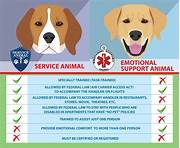Do Emotional Support Animals Count Towards Pet Limit?
Navigating the world of pet ownership can be tricky, especially when it comes to understanding the rules and regulations surrounding emotional support animals (ESAs). In many cases, landlords and property managers have a pet limit, which can raise the question of whether ESAs count towards this limit.

What is an Emotional Support Animal?
An emotional support animal (ESA) is a companion animal that provides emotional support and comfort to individuals with disabilities.
ESAs differ from service animals in that ESAs are not trained to perform specific tasks. Instead, they offer companionship and alleviate symptoms of emotional and psychiatric disabilities.
ESAs and Pet Limits
The Fair Housing Act (FHA) prohibits housing providers from discriminating against individuals with disabilities, including those who rely on ESAs for support.
As a result, landlords and property managers generally cannot enforce pet limits on ESAs.
Exceptions to the Rule:
In certain cases, landlords may be able to restrict ESAs if the animal:
1. Poses a direct threat to the health or safety of others.
2. Causes substantial physical damage to the property.
However, these exceptions are narrowly interpreted.
Proving ESA Legitimacy
To qualify for ESA status, individuals must provide documentation from a licensed mental health professional stating that the animal is necessary for their emotional well-being.
This documentation should include a diagnosis of the disability, a statement of how the animal provides support, and a recommendation for the animal's presence.
Conclusion
In general, ESAs are not subject to pet limits imposed by landlords and property managers.
However, there are some exceptions to this rule, and landlords may be able to restrict ESAs in certain limited circumstances.
Individuals seeking to keep an ESA in a property with a pet limit should provide documentation from a licensed mental health professional to establish the animal's legitimacy.
Declaration: All article resources on this website, unless otherwise specified or labeled, are collected from online resources. If the content on this website infringes on the legitimate rights and interests of the original author, you can contact this website to delete it.






